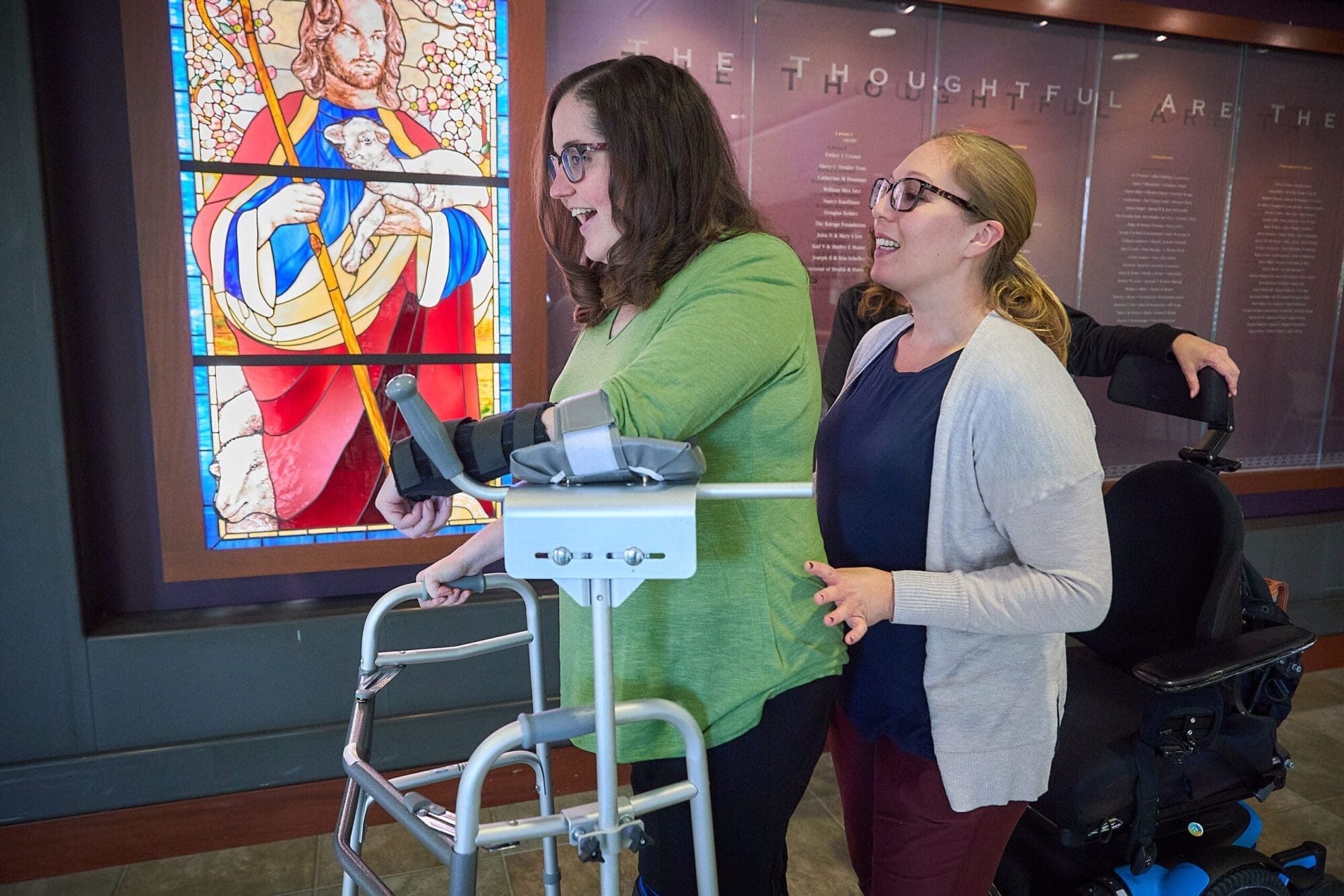Why Choose Us
Learn more about Good Shepherd Rehabilitation Hospital, a destination for recovery for stroke, brain injury, spinal cord injury and complex medical rehabilitation.
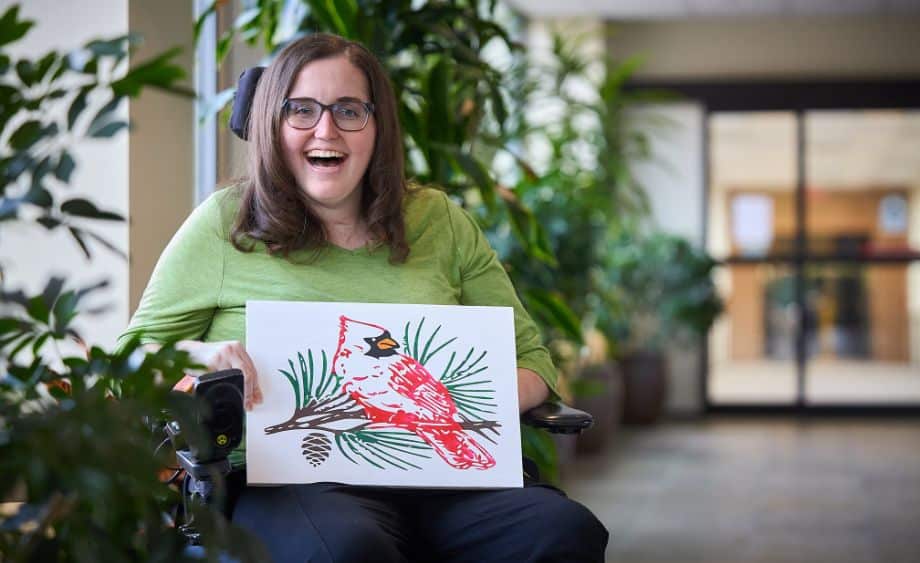
Being in a horrific car accident, suffering a traumatic brain injury (TBI) and not being able to talk, use your limbs or eat solid foods could make someone want to give up. Add to that being one of the first people hospitalized in the Lehigh Valley with a severe case of COVID-19 in 2020.
But Emily Brong is not a quitter.
In fact, Emily is thriving thanks to her positive attitude and commitment to physical, occupational and speech therapy. The 25-year-old from Palmerton, Pa., is proud of how hard she works with her rehabilitation team at Good Shepherd Rehabilitation’s Hyland Center for Health & Technology in Allentown, Pa., to gain physical strength.
Today, she talks enthusiastically, has improved function in her arms and legs and is walking with assistance.
“My Good Shepherd therapists really understand how to treat a brain injury. Plus, I am meeting other patients with brain injuries, and we learn a lot from each other.”
Emily Brong
Making these achievements hasn’t been easy or fast. It’s been almost a decade since a car accident put Emily in the Neuro Trauma Unit at Lehigh Valley Hospital with the TBI and multiple fractures. When it was time for inpatient rehabilitation, Emily’s mother insisted on Good Shepherd Rehabilitation Hospital.
“I worked at Good Shepherd as a nurse for seven years and knew the clinical team had the specialized brain injury care Emily needed,” says Beth Winter, Emily’s mother. “The clinical team there has specialized experience working with patients with brain injuries, so I knew it was the right choice for Emily and our family.”
After inpatient rehabilitation, Emily’s healing journey continued over the years at several outpatient sites. With progress plateauing, that’s when Emily and Beth knew it was time to revisit rehabilitation at the Hyland Center.
Emily accesses advanced rehab technology, like the split-belt treadmill, standing frame and bicycles during physical therapy sessions, while also receiving occupational and speech therapy in the same location.
“I am shocked by the gains Emily made this past year,” says Beth. “She is doing more for herself than I ever thought she would. The therapists really push her to progress. She lost 15 pounds this year doing her therapy and home exercises.”
Tamie Sturgis (pictured with Emily), a home health nurse who has worked with Emily since 2015, says she no longer needs a swivel board to stand and is now able to bend to pick up things without a reacher.
Emily dresses and undresses herself, makes her own bed, takes herself to church (which is next to her house) and applies her own makeup. While Emily once had a G-tube for feeding, she is eating regular food now.
As the Good Shepherd team pushes her physically and mentally, Emily is diligent about following her home exercise routine. With an infectious smile, Emily will tell you that there’s no point in coming to rehab if you don’t do the exercises at home.
“My Good Shepherd therapists really understand how to treat a brain injury,” says Emily. “Plus, I am meeting other patients with brain injuries, and we learn a lot from each other.”
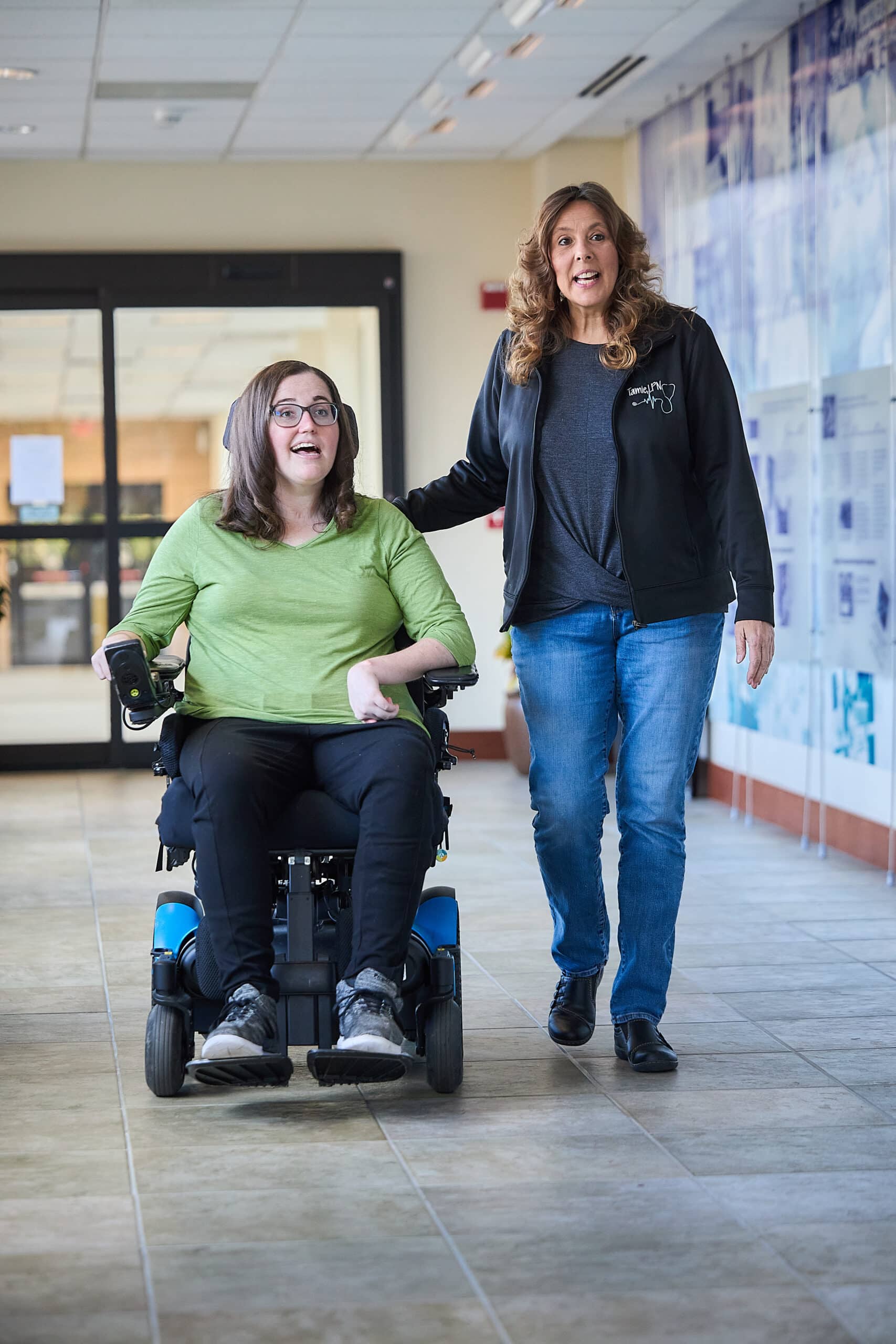
From the time Emily was initially hospitalized after the accident to today, her recovery has been helped by communities beyond Good Shepherd. Her family and friends and Palmerton residents and Carbon County-area businesses all supported her.
There was a parade with Palmerton firetrucks that greeted her when she arrived home from inpatient rehab in 2014. Supporters created a Facebook page seeking prayers, and held multiple fundraisers to help with medical and other expenses. Emily was the Homecoming Queen for Palmerton High School her senior year, and with assistance from her physical therapist at that time, she was able to stand to receive her high school diploma.
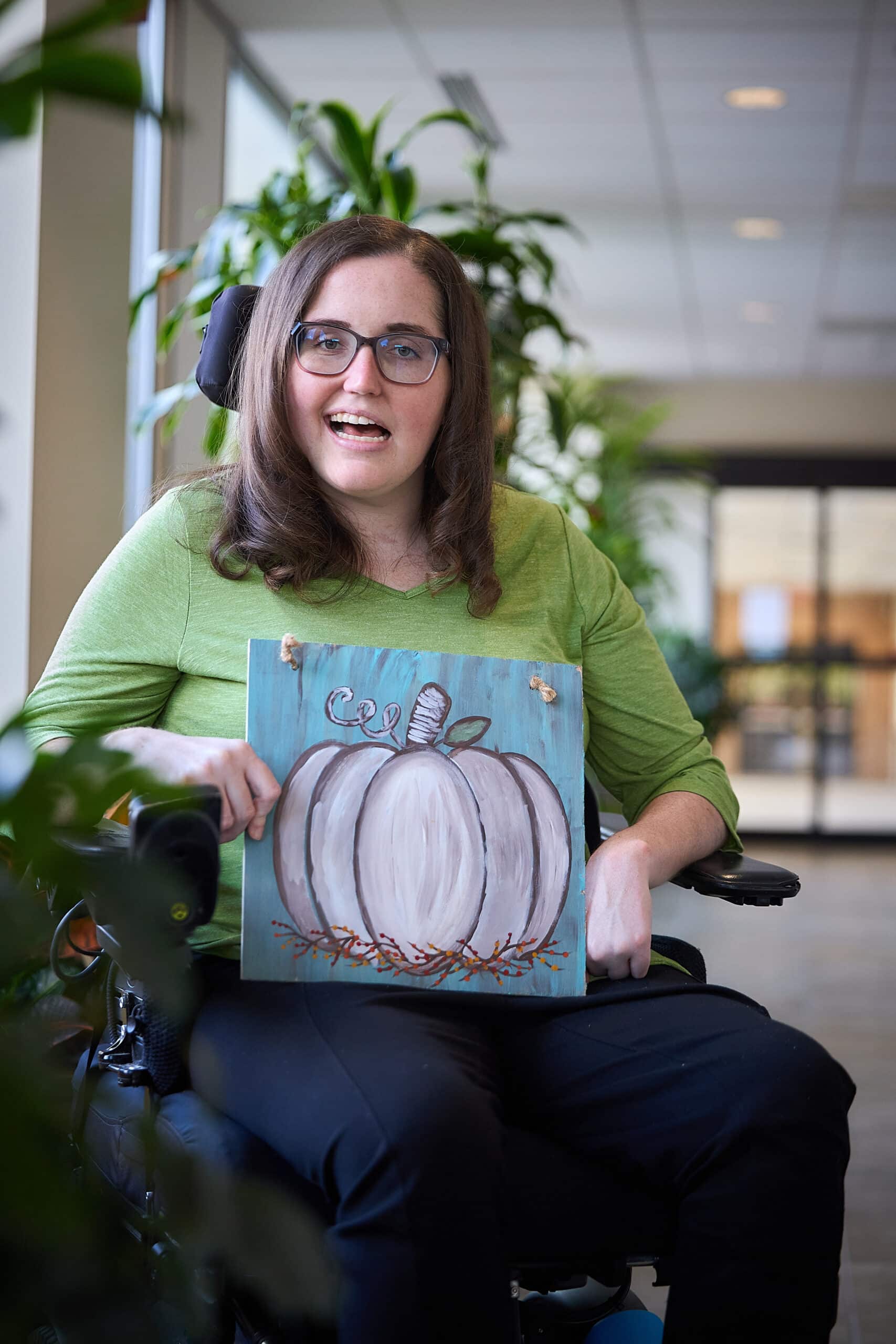
There was a period before coming back to the Hyland Center, though, when Emily spent too much time in front of the TV. Tamie says she pushed Emily to stop spending so much time sitting in a recliner at home. The encouragement from Tamie kept Emily’s recovery advancing, and if you spend some time with the two of them you can see the strong bond and friendship they have formed over the years. Some might call Tamie’s encouragement tough love, but Emily says Tamie is her rock.
Emily’s list of current activities is impressive: painting, creating homemade cards and ornaments, and attending baseball and football games and concerts. She is a volunteer for Dream Come True, helping with bingo and other activities.
Work is another of Emily’s goals. She is seeking a job as a nursing home activities aide or an opportunity that involves using her artistic talent. The Pennsylvania Office of Vocational Rehabilitation is helping Emily find that opportunity. Whatever job she lands, Emily will bring great enthusiasm to it.
Beth says some of that enthusiasm was turned on in Emily’s brain after her stint with COVID-19. After the illness, Beth says Emily began to excel physically and emotionally. Whatever the reason for her upbeat personality, Emily has turned some of that energy into helping others.
Emily says that no matter what she has gone through, there were people there to support her. Being well enough to give back now, she has started advocating for others.
Emily’s health situation can be defined as a “not-well-bodied brain injury patient.” While she’s not the only one in this situation, there are more able-bodied people living with brain injuries and more focus and support is available for those patients. So, Emily is creating awareness about that disparity.
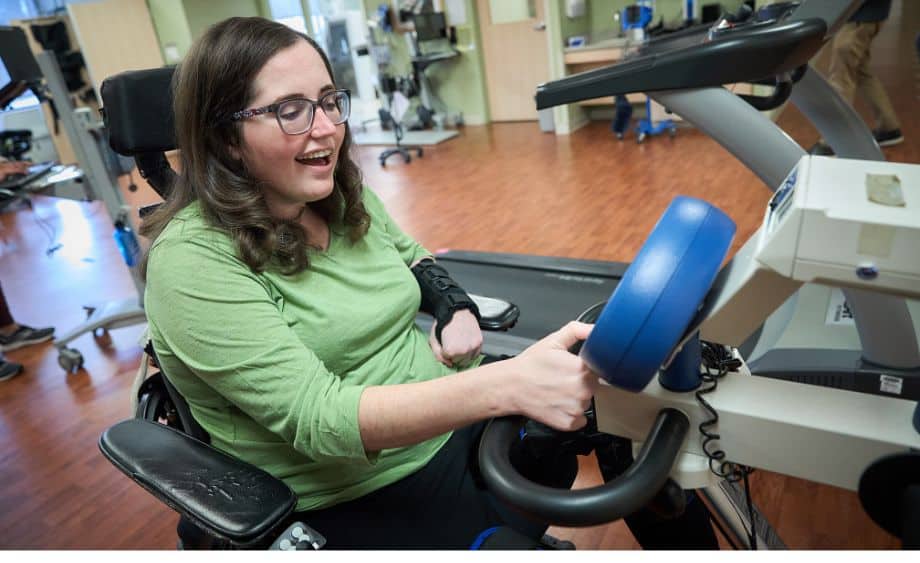
Emily and Beth started the discussion for more support for not-well-bodied brain injury patients at the first annual Mind Your Brain Lehigh Valley conference, hosted by Good Shepherd in September 2023. They intend to continue that advocacy within the greater Lehigh Valley and beyond.
Emily also is a supporter of home-care professionals and is passionate about solving the industry’s staffing challenges. With her mother and brother working full-time jobs, Emily received constant in-home nursing and now 10 hours of care each weekday from Tamie. In fact, Emily went to Harrisburg, writing and presenting her own speech on why people with disabilities need in-home care and her great experience with home-based nursing.
Through it all, Emily says she never asks, “Why me?” She is confident that before the decade mark of her 2014 accident, she will be walking independently.
If you’re a betting person, take that bet because Emily says giving up is not an option.
